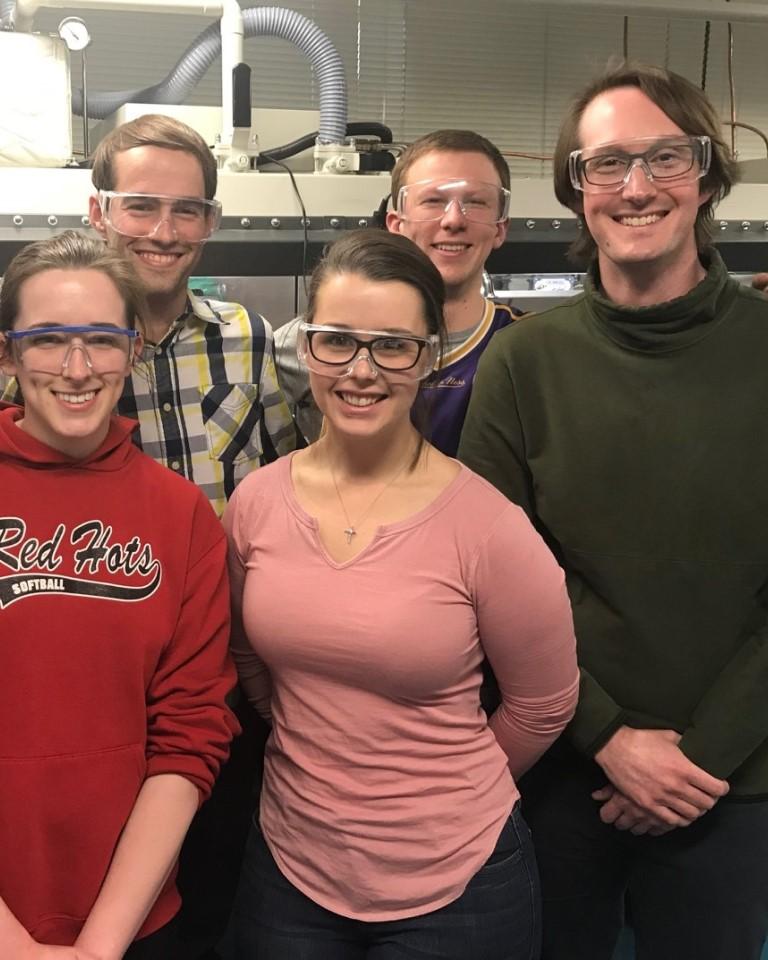James Blakemore

MENTOR SPOTLIGHT | SUMMER 2018
Department: Chemistry
Describe your work in a few sentences that we can all understand: I believe that energy and environmental concerns are the grand challenges of our generation. In my research group, we make and study chemical systems that could lead to new solutions to problems in these areas. For example, carbon dioxide gas is typically considered to be a pollutant and unreactive waste product, but my group is working to find new ways to activate and convert it to useful chemicals. This is very challenging, so we are taking multiple approaches to see what might work!
Q: How did you first get interested in doing research?
A: I was lucky to have two inspirational professors that encouraged me to jump into research: first, Pawan Kahol, and later, Francis D’Souza. Their mentoring changed the course of my life. Dr. D’Souza works in the area of solar energy conversion, and I began to understand how powerful chemistry could be in building a clean energy future with his guidance. Undergraduate research in D’Souza’s lab was the start of the greatest adventure of my life!
Q: What do students in your discipline learn by doing research that they wouldn’t learn by just taking classes?
A: Synthetic chemistry–making new molecules and materials that haven’t been studied before–is incredibly challenging, but can be very rewarding. Students must apply the knowledge gained in class to know how to move forward on a given project. What is the drive to move forward? Making new materials and understanding their properties could lead to new technologies that help overcome real world problems. Even “small” projects, when designed well, teach us important lessons!
Q: What do you find to be the most exciting part of doing research or creative work? What makes this line of work meaningful and interesting to you?
A: Doing chemistry research creates new knowledge—we learn new things that no one has known before! We have the opportunity to be a bit bold—we are pushing the frontier of what is known and trying to find new paths that solve important problems. “Doing chemistry” is the most difficult job I’ve ever taken up, but I love it. I find chemistry meaningful because of the people involved. Working with young people is so exciting—my undergraduates and graduate students remind me every day why we are working so hard—to protect the future. Chemistry is also international—I have a network of colleagues, collaborators, and friends around the world—we work in a common, global research community. Very rewarding, very exciting!
Q: What advice do you have for undergraduates interested in doing research in your field?
A: Finding a good mentor is crucial. Chemistry research is challenging, and can even be frustrating at times. You need a good team around you (labmates!) and a strong mentor. A mentor will help you make career decisions and think about what comes next after college, too. I will add that many chemistry professors at KU are interested in working with motivated undergraduates! Feel free to stop by and chat!
Q: For many students, doing research or a larger creative project is the first time they have done work that routinely involves setbacks and the need to troubleshoot problems. Can you tell us about a time that your research didn’t go as expected? Or about any tricks or habits that you’ve developed to help you stay resilient in the face of obstacles?
A: In chemistry, unexpected problems can actually indicate you’ve found something new. When I was a postdoc, we were doing experiments that involved a compound converting from one form (purple) to another (yellow). But, one day, it turned red! This was a big surprise, and took us a while to figure out what was happening. But, a year later, we published a major journal article describing the unexpected reaction. So, sometimes things are challenging because you’re pushing back the frontier of knowledge. One of my PhD supervisors, Bob Crabtree, taught me that “sometimes, Nature is against us.” For chemists who try to make new things, this means that the system you’ve designed on paper may not really be accessible in real life. No matter how hard you try, it may never work. With my students now, if something isn’t working after a few attempts, we stop and work on something else. It’s important not to waste time on things that don’t work really well!
Q: How do you spend your time outside of work?
A: I like to run, and Lawrence is a great place for it! I also like to travel—both to visit friends and see new places. I can add—I’m a big Doctor Who fan. So, as the tenth Doctor says, “Allons-y!”